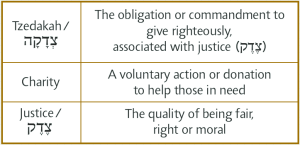
By Rabbi Ari Enkin, rabbinic director, United with Israel
Tzedaka is the Hebrew word for “charity,” although it literally means “justice” or “righteousness.” Charity is an obligation in Judaism, not merely a nice thing to do.
According to the Torah, everybody is obliged to give charity – even one who is dependent on assistance should give to those less fortunate. Although never acted upon nowadays, a Jewish court has the power to compel one who refuses to give charity – or who donates less than his means allow – to give according to the court’s assessment. Such a miserly person can even be flogged, and should he still refuse to give, the court may appropriate his property in the assessed sum for charity.
Women take precedence over men in receiving charity as women generally have a harder time finding employment or making ends meet. So, too, poor relatives come before strangers. There is also the general rule in charity that “the poor of your own town come before the poor of any other town.” Some say the poor of the Land of Israel always take precedence over others.
It is permitted to deceive a poor man who, out of pride, refuses to accept charity by allowing him to think that it is a loan or a gift. As a general rule, one should give approximately 10 percent of income to charity. On the other hand, one should not give more than 20% – we don’t want to see donors becoming poor!

(wheredoyougive.org)
The psychological needs of the poor should also be taken into consideration even though they may appear to be exaggerated. For example, the Talmud records the story of a very wealthy individual who later became poor. The rabbis ruled that he should be provided with a driver from charity funds as he had been accustomed to such a lifestyle. Also, one must be sure not to embarrass or shame the recipient of charity. When Rabbi Yannai saw someone giving a coin to a poor man in public, he said, “It were better not to have given rather than to have given him and shamed him.” Of course, every situation is different.
Charity is donated not only with funds, but also through property and resources. In fact, these are the primary examples of charity in the Torah. For instance:
[1] The mitzvah (commandment) of Pe’ah requires farmers to leave a portion of a crop for the poor (Lev.19:9, 23:22).
[2] The mitzvah of Leket requires the farmer to leave any ears of grain that fell from the reaper’s hand while harvesting for the poor (Ibid).
[3] The mitzvah of Shich’cha requires the farmer to leave behind any forgotten sheaves for the poor. (Deut 24:19)
[4] The institution of the Sabbatical year (Shmita, which we are currently observing) was incorporated in order “that the poor of the people may eat.” (Ex. 23: 11)

Charity box modeled on the Second Temple. (jewishsource.com)
The Talmud is full of interesting teachings relating to charity. Some examples:
Rabbi Assi in the Talmud states that tzedaka is just as important as all the other commandments put together.”
“The poor man does more for the giver by accepting charity than the giver does for the poor man by giving charity.”
Rabbi Eleazar taught that the verse “To do righteousness (tzedaka) and justice is more acceptable to the Lord than sacrifice” means that giving charity is greater than offering a sacrifice.
Our sages teach us that the mitzvah of charity is one that hastens the final redemption, atones for sins and blesses the donor with wise, wealthy and learned children. Giving charity is the way in which man can “walk after the Lord your God.” (Deut. 13:5)
Eight Levels of Charity
Rabbi Moses Maimonides (Rambam) teaches that there are eight levels of charity, each greater than the next:
[1] The greatest level of charity is to make another person self-sufficient so that he need not accept charity. This can be accomplished by giving person a job or a loan so that he can establish a business for himself, and the like.
[2] A lesser level is to give to the poor without knowing to whom one gives and without the recipient knowing from who he received.
[3] A lesser level is when one knows to whom one gives but the recipient does not know his benefactor.
[4] A lesser level of charity is when one does not know to whom one gives but the poor person does know his benefactor.
[5] A lesser level is when one gives to the poor person directly into his hand, but gives before being asked.
[6] A lesser level is when one gives to the poor person after being asked.
[7] A lesser level is when one gives inadequately, but gives gladly and with a smile.
[8] The lowest level of charity is when one gives unwillingly.
Do You Love Israel? Make a Donation - Show Your Support!
Donate to vital charities that help protect Israeli citizens and inspire millions around the world to support Israel too!
Now more than ever, Israel needs your help to fight and win the war -- including on the battlefield of public opinion.
Antisemitism, anti-Israel bias and boycotts are out of control. Israel's enemies are inciting terror and violence against innocent Israelis and Jews around the world. Help us fight back!






















